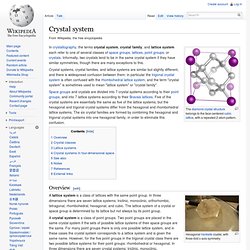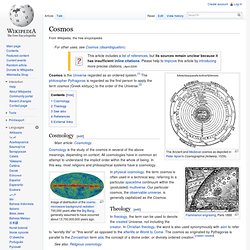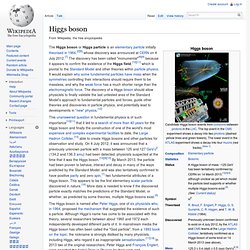

Crystal system. In crystallography, the terms crystal system, crystal family, and lattice system each refer to one of several classes of space groups, lattices, point groups, or crystals.

Informally, two crystals tend to be in the same crystal system if they have similar symmetries, though there are many exceptions to this. Crystal systems, crystal families, and lattice systems are similar but slightly different, and there is widespread confusion between them: in particular the trigonal crystal system is often confused with the rhombohedral lattice system, and the term "crystal system" is sometimes used to mean "lattice system" or "crystal family".
Space groups and crystals are divided into 7 crystal systems according to their point groups, and into 7 lattice systems according to their Bravais lattices. Five of the crystal systems are essentially the same as five of the lattice systems, but the hexagonal and trigonal crystal systems differ from the hexagonal and rhombohedral lattice systems.
Life. Mind. Econonomy. Cosmos. Cosmos is the Universe regarded as an ordered system.[1] The philosopher Pythagoras is regarded as the first person to apply the term cosmos (Greek κόσμος) to the order of the Universe.[2] Cosmology[edit] Cosmology is the study of the cosmos in several of the above meanings, depending on context.

All cosmologies have in common an attempt to understand the implicit order within the whole of being. In this way, most religions and philosophical systems have a cosmology. In physical cosmology, the term cosmos is often used in a technical way, referring to a particular spacetime continuum within the (postulated) multiverse. Higgs boson. The Higgs boson is named after Peter Higgs, one of six physicists who, in 1964, proposed the mechanism that suggested the existence of such a particle.

Although Higgs's name has come to be associated with this theory, several researchers between about 1960 and 1972 each independently developed different parts of it. In mainstream media the Higgs boson has often been called the "God particle", from a 1993 book on the topic; the nickname is strongly disliked by many physicists, including Higgs, who regard it as inappropriate sensationalism.[17][18] In 2013 two of the original researchers, Peter Higgs and François Englert, were awarded the Nobel Prize in Physics for their work and prediction[19] (Englert's co-researcher Robert Brout had died in 2011).